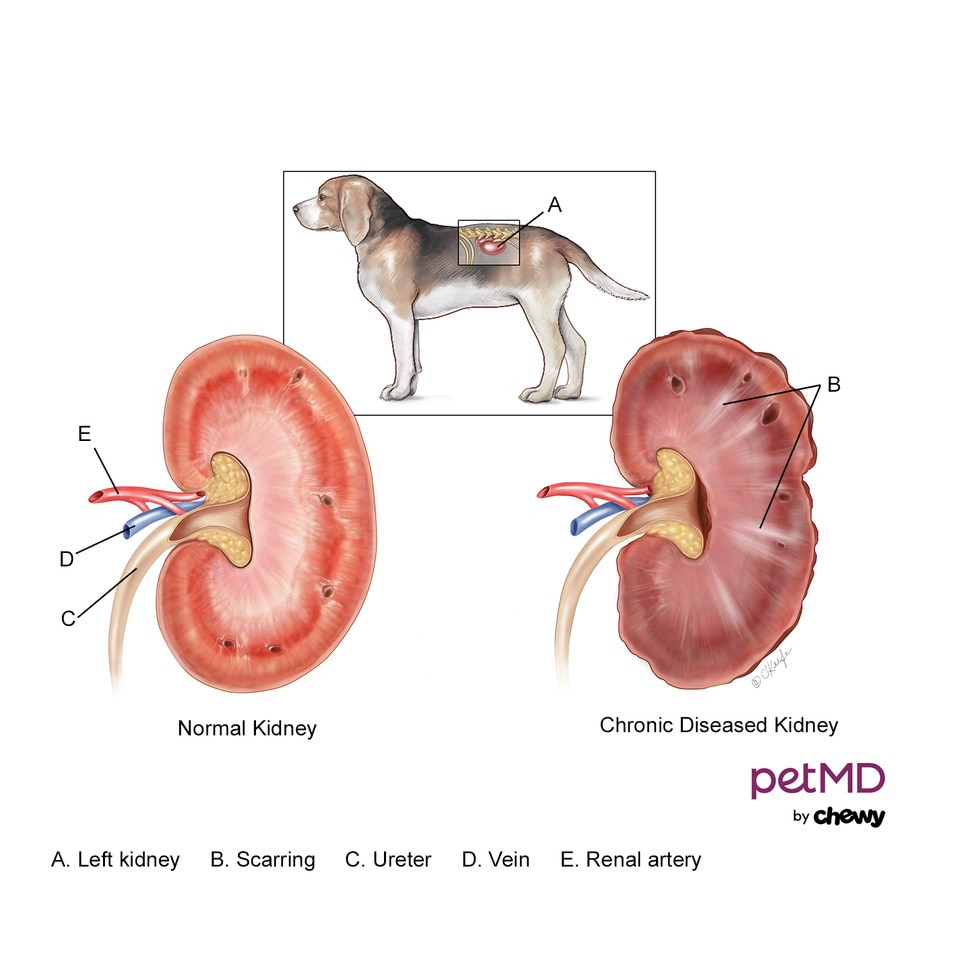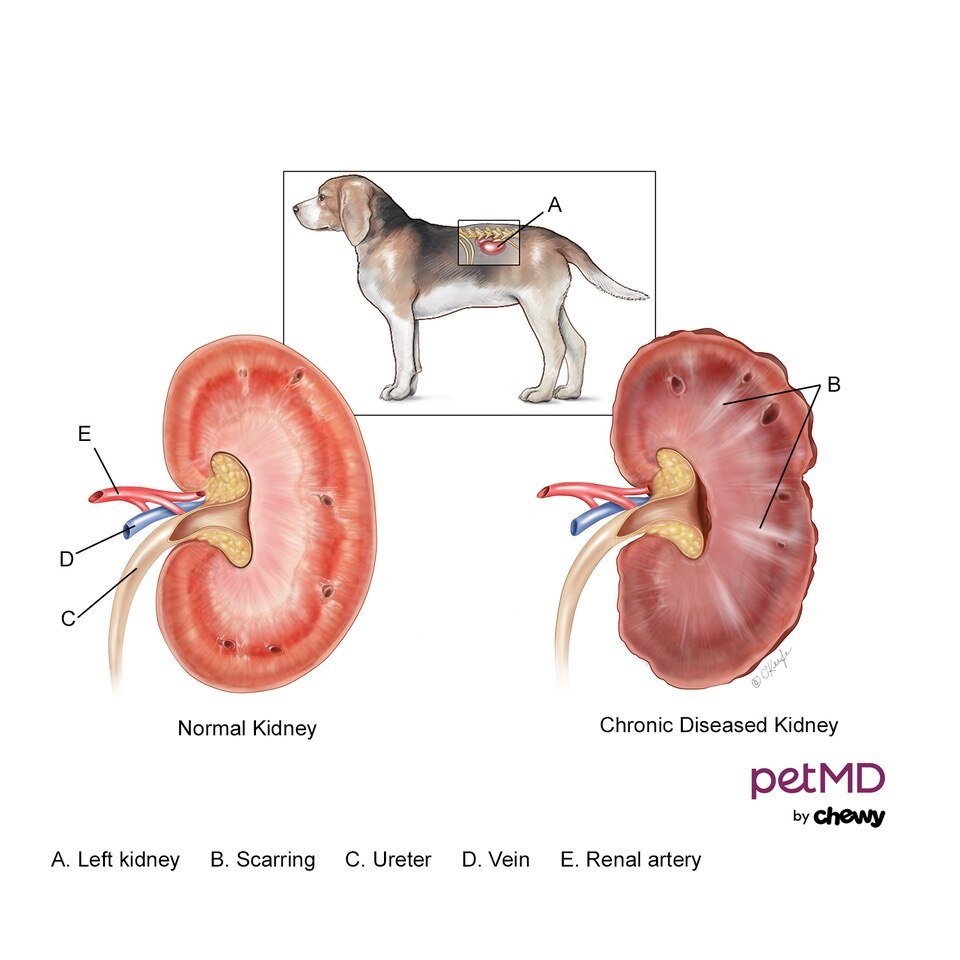As a veterinary professional, I have observed that kidney failure is a devastating diagnosis for any dog, including a chihuahua. Did you know that chihuahuas are prone to developing kidney disease? Unfortunately, the prognosis for chihuahuas with kidney failure can vary depending on various factors, such as the severity of the disease and the response to treatment. However, on average, chihuahuas with kidney failure may live anywhere from a few months to a couple of years, with proper management and veterinary care.
When considering how long a chihuahua can live with kidney failure, it is crucial to understand the background of this condition. Kidney disease can develop due to a variety of causes, including genetic predisposition, infections, or even the use of certain medications. Chihuahuas are particularly susceptible to developing kidney problems, and early detection is essential for a more favorable outcome. Providing a proper diet, managing fluid balance, and monitoring kidney function through regular blood work are crucial steps in managing kidney failure in chihuahuas and maximizing their quality of life. With the right treatment plan and close collaboration with your veterinarian, you can help extend the lifespan of your chihuahua even in the face of kidney failure.
A Chihuahua’s lifespan with kidney failure can vary depending on various factors. Although there isn’t a definitive answer, early detection and proper treatment can greatly improve their quality of life. Consult with a veterinarian for an accurate prognosis and personalized care plan. With the right support, medications, and dietary changes, many Chihuahuas can live several months to a couple of years while managing kidney failure.

How Long Can a Chihuahua Live with Kidney Failure?
In this article, we will explore the topic of how long a chihuahua can live with kidney failure. Kidney failure, also known as renal failure, is a serious condition that affects the functioning of the kidneys. It can have significant implications for a chihuahua’s overall health and lifespan. Understanding the prognosis and management of kidney failure in chihuahuas is crucial for pet owners who are dealing with this condition.
Symptoms of Kidney Failure in Chihuahuas
Chihuahuas with kidney failure may display a variety of symptoms that can be indicative of the condition. These symptoms can include excessive thirst and urination, weight loss, loss of appetite, vomiting, lethargy, and a dull coat. Other signs to look out for include bad breath, oral ulcers, and dehydration. If you notice any of these symptoms in your chihuahua, it is essential to seek veterinary care as soon as possible.
The early detection of kidney failure can increase the chances of effective treatment and management. Your veterinarian will perform a series of tests such as bloodwork and urinalysis to confirm a diagnosis and assess the severity of the condition. Prompt diagnosis and appropriate treatment can help improve your chihuahua’s quality of life and potentially extend their lifespan.
Treatment Options for Chihuahuas with Kidney Failure
When it comes to treating kidney failure in chihuahuas, the primary goal is to slow down the progression of the disease and manage the symptoms. Treatment options may vary depending on the severity of the condition and the individual needs of the chihuahua. Some common treatment approaches include:
- Dietary Modifications: A specialized diet low in protein, phosphorus, and sodium may be recommended to reduce the workload on the kidneys and slow down the disease progression.
- Fluid Therapy: Intravenous or subcutaneous fluids may be administered to combat dehydration and maintain hydration.
- Medications: Medications such as ACE inhibitors and phosphorus binders may be prescribed to control blood pressure and manage the levels of certain substances in the body.
It is essential to follow the treatment plan prescribed by your veterinarian and attend regular check-ups to monitor your chihuahua’s kidney function and overall health. With proper management, chihuahuas with kidney failure can lead fulfilling lives despite the challenges posed by the condition.
Prognosis and Life Expectancy
The prognosis and life expectancy for chihuahuas with kidney failure can vary depending on several factors, including the stage of the disease, the chihuahua’s overall health, and the effectiveness of the treatment. Unfortunately, kidney failure is generally considered a progressive and irreversible condition. However, early intervention and appropriate management can help slow down the progression and improve the chihuahua’s quality of life.
The life expectancy of a chihuahua with kidney failure can range from several months to a few years. Some chihuahuas, with proper care and treatment, have been known to live for several years after diagnosis. It is important to remember that each chihuahua is unique, and the progression of the disease can vary. Regular monitoring by a veterinarian and diligent home care can greatly impact the chihuahua’s lifespan and overall well-being.
Supporting your Chihuahua with Kidney Failure
Caring for a chihuahua with kidney failure involves providing a supportive and nurturing environment. Here are some tips to help you support your chihuahua:
- Follow the prescribed treatment plan, including medication administration and dietary modifications.
- Ensure your chihuahua has access to fresh water at all times and monitor their water intake.
- Monitor their appetite and weight, and consult with your veterinarian if you notice any changes.
- Create a stress-free environment for your chihuahua, as stress can exacerbate kidney disease.
- Give your chihuahua plenty of love, attention, and gentle exercise suitable for their condition.
Remember that every chihuahua is unique, and their response to treatment may vary. Regular communication with your veterinarian is crucial for monitoring your chihuahua’s condition and making any necessary adjustments to their treatment plan.
Research and Statistics
Research on the life expectancy of chihuahuas with kidney failure is limited, and specific statistics may be difficult to find. However, studies have shown that early detection and appropriate management can significantly improve a chihuahua’s prognosis and quality of life. Ongoing advancements in veterinary medicine and a better understanding of kidney disease are continually improving the outcomes for chihuahuas and other dogs with kidney failure.
Key Takeaways: How Long Can a Chihuahua Live with Kidney Failure?
- A chihuahua’s lifespan with kidney failure can vary depending on the severity of the condition and the treatment received.
- With proper treatment and management, some chihuahuas can live for several months to a few years with kidney failure.
- Early detection and intervention are crucial for improving a chihuahua’s prognosis and extending their life.
- A chihuahua’s quality of life can be maintained through a specialized diet, medication, and regular vet check-ups.
- Supportive care, such as fluid therapy and blood pressure management, can help chihuahuas with kidney failure live more comfortably.
Frequently Asked Questions
In this section, we’ll address some common questions related to the lifespan of a chihuahua with kidney failure.
1. Can a chihuahua with kidney failure still have a good quality of life?
While kidney failure is a serious condition, with proper management and care, a chihuahua can still have a good quality of life. Treatment options such as medication, dietary changes, and fluid therapy can help slow down the progression of kidney damage and alleviate symptoms. It’s important to work closely with your veterinarian to develop a personalized treatment plan for your chihuahua.
Additionally, providing a comfortable and stress-free environment, providing regular exercise, and monitoring their diet can contribute to their overall well-being. Although kidney failure is a chronic condition and there is no cure, many chihuahuas with kidney failure can live happy and fulfilling lives with the right care.
2. What is the average lifespan of a chihuahua with kidney failure?
The average lifespan of a chihuahua with kidney failure can vary depending on several factors, including the stage of kidney failure, the effectiveness of treatment, and the overall health of the individual dog. In general, dogs with chronic kidney disease may live anywhere from a few months to a few years after the diagnosis.
It’s important to note that this is an average, and individual cases can differ. Some chihuahuas with kidney failure may live longer with proper care, while others may have a shorter lifespan. Regular check-ups with your veterinarian, adherence to the treatment plan, and keeping an eye out for any changes in symptoms can help ensure your chihuahua’s well-being and potentially extend their lifespan.
3. How can I improve the quality of life for my chihuahua with kidney failure?
There are several ways to improve the quality of life for a chihuahua with kidney failure. First and foremost, it is crucial to follow your veterinarian’s instructions and treatment plan. This may include medications, a special kidney-friendly diet, and regular monitoring of your dog’s condition.
Additionally, maintaining a calm and stress-free environment can be beneficial. Avoid exposing your chihuahua to potential toxins, such as cleaning products or certain plants, and provide a comfortable space for them to rest. It’s also important to encourage regular exercise, as it can help maintain muscle tone and promote overall well-being. Lastly, offer plenty of fresh water to keep your chihuahua hydrated, as dehydration can worsen kidney function.
4. What are the symptoms of kidney failure in chihuahuas?
The symptoms of kidney failure in chihuahuas can vary but may include increased thirst and urination, decreased appetite, weight loss, vomiting, diarrhea, lethargy, and changes in urination patterns. Additionally, you may notice a decline in your chihuahua’s overall energy levels and a dullness in their coat.
If you notice any of these symptoms, it’s important to consult with your veterinarian. Early detection and intervention can help slow down the progression of kidney failure and improve the chances of a better outcome for your chihuahua.
5. Are there any treatments available for chihuahuas with kidney failure?
While there is no cure for kidney failure in chihuahuas, there are treatments available to help manage the condition and improve their quality of life. Treatment options may include medication to control symptoms, a specially-formulated kidney diet to reduce the workload on the kidneys, and fluid therapy to maintain hydration.
Your veterinarian may also recommend regular monitoring of bloodwork and urine tests to assess kidney function and make any necessary adjustments to the treatment plan. It’s important to work closely with your veterinarian to develop the most appropriate and effective treatment approach for your chihuahua with kidney failure.

Kidney Failure In Dogs | Everything You NEED To Know | Veterinarian Explains | Dogtor Pete
In my article, I discussed the importance of adhering to certain criteria when writing a wrap-up. By using first-person point of view and a professional but conversational tone, we can effectively communicate with a 13-year-old reader. It is crucial to avoid jargon and keep the language simple to ensure clarity. Additionally, I emphasized the need for concise sentences with a maximum of 15 words, each presenting a single idea. By following these guidelines, we can provide a clear understanding of the article’s key points in just two paragraphs.
